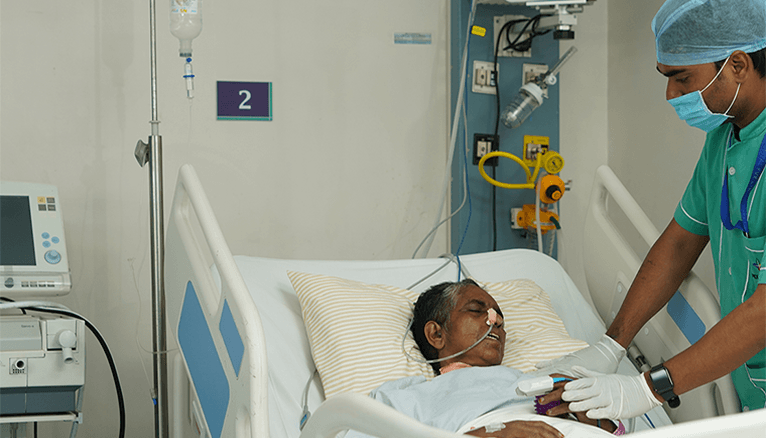Inside the ICU: A Comprehensive Guide to the Intensive Care Unit
By:

Apex Hospitals
22-07-2023 5 Min Read

Understanding the Purpose and Importance of an ICU
The ICU is a designated area within a hospital equipped with state-of-the-art medical technology and staffed by highly trained professionals to provide intensive care to patients with life-threatening conditions. Its primary purpose is to monitor, stabilize, and treat critically ill individuals who require advanced support for their vital functions. The ICU serves as a critical lifeline, offering specialized interventions and round-the-clock care to patients at the highest risk of complications or death
The Meaning and Full Form of ICU
ICU stands for Intensive Care Unit. This specialized unit is designed to provide comprehensive care to individuals with critical illnesses or injuries. The ICU is equipped with advanced medical equipment and staffed by a multidisciplinary team of healthcare professionals who work collaboratively to provide the highest level of care to needy patients.
Who Needs an ICU and Why?
Patients who require admission to the ICU have experienced severe trauma, undergone significant surgeries, or suffered from life-threatening illnesses. These individuals have unstable vital signs, compromised organ function, or other critical medical conditions requiring constant monitoring and immediate intervention. The ICU is equipped to handle a wide range of cases, including but not limited to patients with severe respiratory distress, cardiac emergencies, neurological crises, and post-operative complications.
Common Conditions Treated in an ICU
The ICU treats many critical conditions, each demanding specialized care and interventions. Some of the common conditions treated in an ICU include:
- Severe respiratory distress syndrome
- Heart failure
- Sepsis
- Multiple organ failure
- Traumatic injuries
- Neurological emergencies such as strokes or brain haemorrhages.
The ICU offers a comprehensive approach to managing these conditions, focusing on stabilizing vital signs, providing respiratory support, administering appropriate medications, and ensuring the best possible outcomes for patients.
The Role of Medical Professionals in the ICU
The ICU is staffed by a multidisciplinary team of medical professionals who work collaboratively to provide the highest level of care to critically ill patients. This team typically includes intensivists, specialized physicians trained in critical care medicine, critical care nurses, respiratory therapists, pharmacists, and other healthcare professionals. Each team member plays a vital role in ensuring the well-being and recovery of patients in the ICU
Equipment and Technology used in the ICU
The ICU is equipped with a wide array of advanced medical equipment and technology to monitor and support the vital functions of critically ill patients. This includes devices for constant monitoring of heart rate, blood pressure, oxygen levels, and other vital signs. Ventilators are used to provide respiratory support to patients who are unable to breathe adequately on their own. Invasive monitoring devices, such as arterial and central venous catheters, are utilized to closely monitor the status of various organs and guide medical interventions. Additionally, the ICU is equipped with imaging technology, such as X-rays and ultrasound, to aid in diagnosing and managing critical conditions.
Life-saving Interventions and Treatments in the ICU
The ICU is equipped to provide life-saving interventions and treatments to critically ill patients. These interventions may include:
- Advanced cardiac life support measures, such as cardiopulmonary resuscitation (CPR) and defibrillation, restore normal heart rhythm in cases of cardiac arrest.
- Invasive procedures, such as intubation and mechanical ventilation, are performed to support respiratory function and ensure adequate oxygenation.
- The administration of intravenous medications, blood transfusions, and specialized therapies are tailored to each patient's specific needs, aiming to stabilize their condition and promote recovery.
The ICU Environment and Patient Care
The ICU environment is designed to provide a controlled, sterile setting that promotes patient safety and optimal care. The unit is typically divided into individual patient bays, allowing for privacy and minimizing the risk of infections. The nursing staff closely monitors patients, ensuring regular assessments of their vital signs, administering medications and providing comfort and emotional support. Family members are encouraged to visit and participate in caring for their loved ones. At the same time, infection control measures are strictly implemented to minimize the risk of spreading infections within the ICU.
Challenges and Considerations in the ICU
The ICU presents a unique set of challenges and considerations for both patients and healthcare professionals, such as,
- The complexity of critical conditions
- The need for rapid decision-making
- The emotional toll on patients and their families
Healthcare professionals in the ICU require specialized training and expertise to manage critically ill patients effectively. Furthermore, the high cost of ICU care and resource allocation pose significant challenges for healthcare systems worldwide.
In conclusion, the Intensive Care Unit (ICU) is indispensable in modern healthcare. It provides specialized care to critically ill patients, ensuring their vital signs are closely monitored, and advanced medical interventions are promptly delivered. The ICU serves as a lifeline for individuals with life-threatening conditions, offering hope, support, and the best possible chance of recovery. The dedicated professionals, advanced technology, and comprehensive approach to care in the ICU make it a vital component of healthcare systems worldwide. By understanding the importance of ICU, its purposes and intricacies, we gain a deeper appreciation for the tireless efforts of healthcare professionals and the critical role they play in saving lives.
Related Articles
Connect With Us
Health In A Snap, Just One App.
KNOW MORE































































